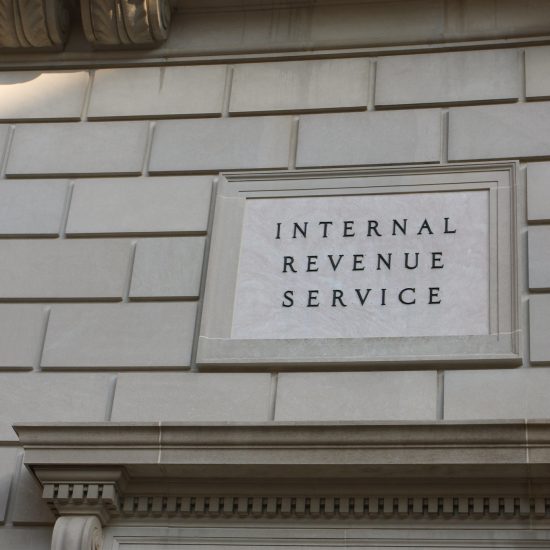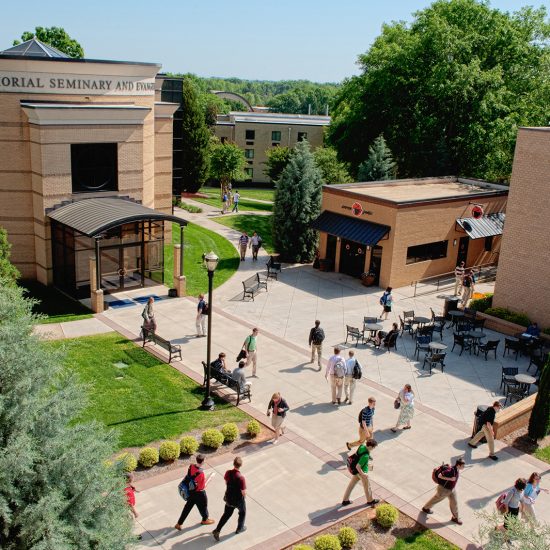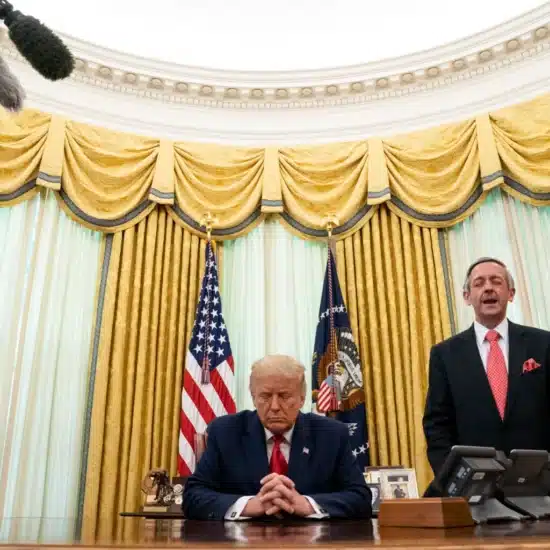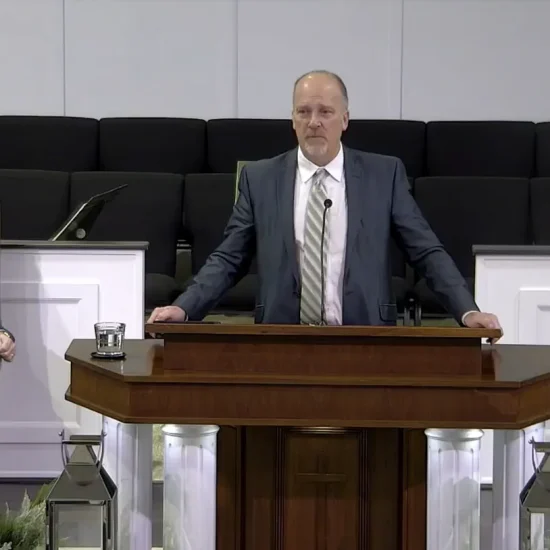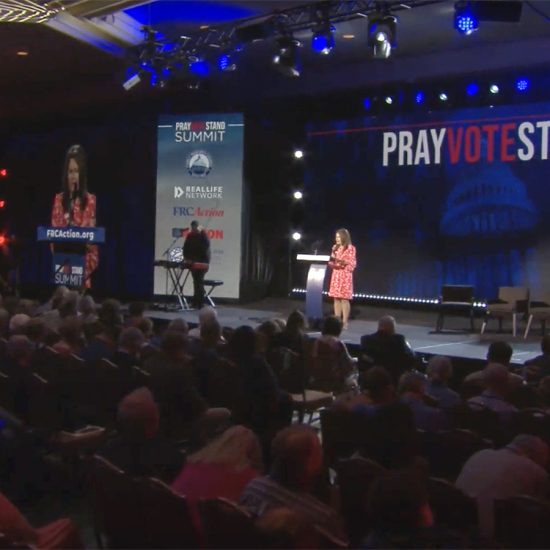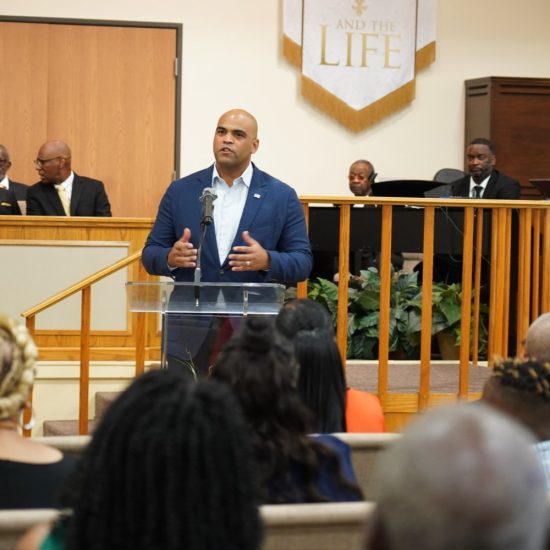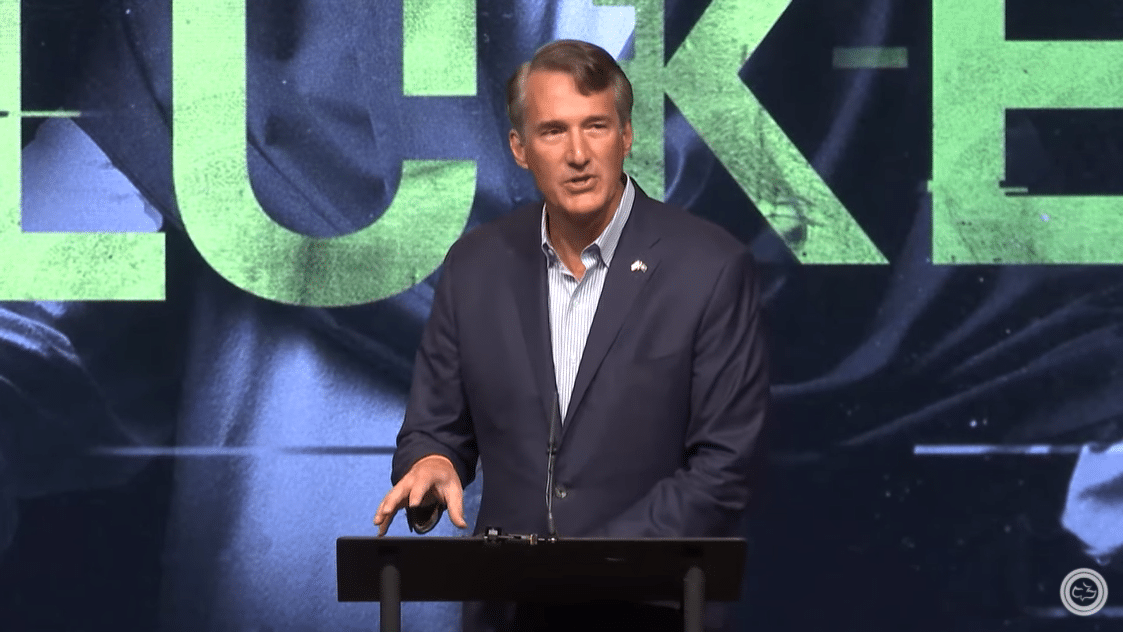
Rev. Gary Hamrick believes pastors should preach about political candidates — and tell their flocks who is worthy of support — as part of “the Gospel applied.” Failing to do so risks “undermining that relevance of the Gospel.” The senior pastor of Cornerstone Chapel in Leesburg, Virginia, made these remarks last week at the Family Research Council’s annual political advocacy conference, which was held this year at Hamrick’s church.
Joining him at the event’s podium were a number of other conservative Christian activists and Republican politicians like U.S. Sens. Josh Hawley, James Lankford, and Roger Moran; U.S. Reps. Bob Good, Vicki Hartzler, and Mike Waltz; former Secretary of State Mike Pompeo; and former Ambassador Sam Brownback. The Virginia Republican gubernatorial hopeful, Glenn Youngkin, also addressed the conference.
This past Sunday, Hamrick practiced what he preached by inviting Youngkin back to Cornerstone. But this time Youngkin spoke during the worship service as he sought votes in the upcoming election.
Not to be outdone, the campaign of Youngkin’s Democratic opponent and Virginia’s former governor, Terry McAuliffe, announced the next day (Oct. 11) that he would make campaign stops in not one but three churches this coming Sunday alongside former Georgia Democratic gubernatorial candidate Stacey Abrams.
Given the time these two candidates are spending in church, you might presume there’s a religious revival going on in Virginia. Alas, this is nothing more than politicians locked in a tight race and seeking every advantage. Unfortunately, we believe the benefit they seek imposes a great cost on the congregations they visit.
The Virginia gubernatorial election often garners outsized attention from national media because it’s one of the few major races occurring between a presidential campaign year and the next cycle of congressional elections. As Julia Manchester noted for The Hill, “The off-year election is being viewed by many as a bellwether ahead of next year’s midterm elections.” The race often goes against the party in the nearby White House, just as the midterms traditionally do 12 months later. And so, political watchers turn their collective attention to the Old Dominion.
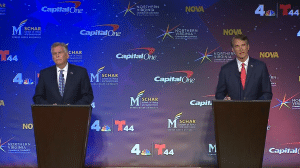
Screengrab as Virginia gubernatorial candidates Terry McAuliffe (left) and Glenn Youngkin face off in a debate on Sept. 28, 2021.
Last month, we reported how California gubernatorial recall candidates in both parties actively campaigned during church services. Now, we find similar politicking from pulpits on the other side of the country. In this issue of A Public Witness, we turn our spotlight on the race in Virginia to again plead for preserving the sacredness of sanctuaries. We will take you inside church services featuring Youngkin or McAuliffe, and analyze the mini “sermons” they’re preaching.
Campaign Testimony
Youngkin played a key role in founding Holy Trinity Church in McLean and continues to serve as a lay leader there. It describes itself as a “non-denominational church with Anglican roots and a contemporary charismatic expression.” Here’s how Laura Vozzella, who covers Virginia politics for the Washington Post, described the impact of his faith during a recent profile: “By all accounts a deeply religious and humble man, Youngkin — who started Holy Trinity Church, or HTC, out of his basement — opens campaign staff meetings with prayer.”
Unlike politicians who superficially claim a church affiliation, Youngkin is highly engaged with his congregation. He started a private foundation with his wife in 2016 that owns the property where Holy Trinity meets today. Valued at $6 million, the church rents the property for $1 a year. The foundation similarly supports a Christian retreat center.
And Youngkin has served on the church’s vestry leadership team. An undated “statement of faith and politics” published after June of 2020 but apparently before February of 2021, is among the “vestry updates” on the church’s site. Noting they are “a church located in the shadow of the nation’s capital, with many congregants employed by or involved in government and politics,” the statement explains it’s designed to outline how the congregation “should — or should not — engage in electoral politics.”
Quoting from the IRS’s political campaign activity ban (also commonly called the “Johnson Amendment”) that prohibits 501(c)3 nonprofits like HTC from engaging in partisan politics, the statement declares, “We are resolute in upholding this law, and as such, no HTC communications channels or facilities may be utilized in the service of any political party or campaign.” It does add, however, that this rule doesn’t prohibit members, “in their individual capacities, from entering public service or from participating in the political process.”
While Youngkin and other HTC leaders would not allow a gubernatorial candidate to campaign during a service, it hasn’t stopped him from employing the strategy elsewhere. We’ve found on his social media two references to attending a church service for the campaign, and one other reference to attending a church picnic on the 4th of July (which was a Sunday). Youngkin shared photos of himself and the GOP lieutenant governor candidate at a predominantly Black church in Richmond on Oct. 3. But the photos don’t show him speaking to the church, nor do the videos from the church’s services that morning.
A week later, Youngkin tweeted photos from his visit to Cornerstone Chapel, a predominantly White nondenominational church that offers a downloadable letter to help people assert a religious exemption to a COVID-19 vaccine mandate. Unlike Youngkin’s own church, Cornerstone holds no compunction about mixing faith and politics in partisan ways — as Pastor Hamrick admitted.
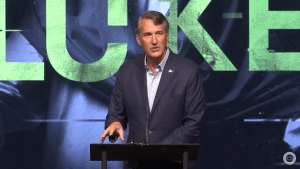
Screengrab as Glenn Youngkin speaks during Sunday worship at Cornerstone Chapel in Leesburg, Virginia, on Oct. 10, 2021.
We found the video from the Cornerstone service, during which Youngkin testified a bit about his personal faith and the “transformational journey of my life.” He added, “Through Jesus’s love and his resurrection we are set free.” But then Youngkin shifted to talking about his campaign, which he said grew out of “an amazing call on my prayer life.” He delivered his common campaign talking points, to several moments of applause, on “freedom” and fighting “big government.” He also promised that his first act after taking the oath of office “on a holy Bible” will be to lead the Commonwealth “in a moment of prayer” to give thanks and ask for guidance, and then at the end they will “say ‘amen’ together as a Commonwealth.”
As noted above, Youngkin isn’t the only candidate looking for votes in the pews. In most races, we find bipartisan offenders as both Republicans and Democrats give campaign speeches in houses of worship — sometimes even after criticizing their opponent for doing so. In the current Virginia race, the high-energy McAuliffe is frequently “attending” church.
Circuit Rider
On Sept. 12, McAuliffe, a self-described “very strong Catholic,” made the rounds to predominantly Black congregations in the adjoined cities of Chesapeake and Norfolk. He offered brief remarks at the front of each church sanctuary and then, apparently, quickly left to make the next spot on his whirlwind tour. He shared images of himself on Twitter that morning from nine churches (and mentioned he was going to 11 that morning). We found full videos of the services that included McAuliffe’s remarks from six of the nine congregations he identified and found a clip from a seventh church. We watched them all so you don’t have to, unless you want to enjoy two months of Sunday mornings in one day!
Several other Democratic candidates joined him, including the lieutenant governor nominee and some local candidates. While each candidate stood up front and was introduced, at each church only McAuliffe spoke.
McAuliffe shared on Twitter a visit to another church on Sept. 26 in Alexandria, and two more on Oct. 3 in Spotsylvania. We found videos of both of the Oct. 3 services with McAuliffe’s comments. There may have been other appearances he didn’t tout on social media like the two unnamed churches from Sept. 12.
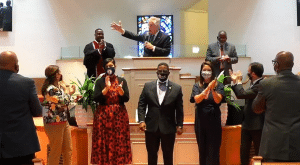
Screengrab as Terry McAuliffe speaks during Sunday worship at Mount Zion Baptist Church in Norfolk, Virginia, on Sept. 12, 2021, as other Democratic candidates stand in front of him.
Together, those nine videos expose these church visits as merely partisan campaign stops that interrupted congregations at worship, sometimes quite literally. The candidates were ushered forward at whichever point in the service they arrived. At one church, someone walked on stage to whisper into the worship leader’s ear in the middle of a song that soon was brought to a close so the candidates could speak.
At each church, McAuliffe detailed his campaign promises and explicitly urged the congregants to vote for him. He even mentioned his campaign website at some stops. During both visits on Oct. 3, he invited people to join him at a rally in town after church. In his remarks, which were quite similar each time, he attacked both his opponent Youngkin as well as former President Donald Trump.
Perhaps most tellingly, his speeches, with one exception, were devoid of religious content other than a thank you at the start to the pastor and church, and the common politician’s litany at the end of “God bless.” Change the thank you reference to the host and these speeches could’ve been delivered verbatim at a campaign rally in a local park, civic center, or pizza place.
“It’s campaign time,” McAuliffe said as he started his pitch at Mount Zion Baptist Church in Norfolk in case people didn’t realize why he was standing in the pulpit. “Early vote starts this coming Friday. So, people need to vote. I’m running.”
After talking about his record in his previous term as governor, he said at The Mount in Chesapeake, “That’s why I’m running for governor again. And I’d love your support.”
“Help me win,” McAuliffe added. “Get out there and vote.”
“This is a competitive race; it always is. If you don’t vote, things don’t happen,” he similarly declared at New Galilee Missionary Baptist Church in Chesapeake. “Early vote starts Friday. Let’s get out there and show them we’re going to take Virginia to the next level. This state’s going to take off like a booster rocket!”
“I need your help,” he said at Mt. Zion Baptist Church in Spotsylvania. “I’m running against someone who’s been endorsed by Donald Trump four times.”
McAuliffe even mentioned that he tends to show up during elections, statements that seemed to suggest a lack of self-awareness and shame about his church visits. In his remarks at The Mount, he declared, “I love The Mount. The last time I was here it was on Mother’s Day when I was running in the primary. And I was able to win the primary. I won every city and county — first time in 80 years — I’m giving full credit to The Mount for that.” At New Galilee Missionary Baptist Church, he referenced attending during his previous gubernatorial campaign, noting “eight years ago when I stood here before you.” At First Baptist Church Campostella in Norfolk, he acknowledged he came the last time he ran but added he did what “no other politician did” as he came back after the election to say “thank you.”
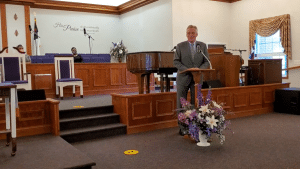
Screengrab as Terry McAuliffe speaks during Sunday worship at Mt. Zion Baptist Church in Spotsylvania, Virginia, on Oct. 3, 2021.
Over and over again McAuliffe offered his exaggerated praise for his hosts. At Second Calvary Baptist Church in Norfolk, he declared, to applause, it was “an honor to be back” at “the greatest Baptist church in the United States of America, and the greatest pastor.” But then just a few minutes later, he started his remarks at another Baptist church in Norfolk with the same applause-sparking rhetoric: “Is this not the greatest Baptist Church in America? Because of the greatest congregation, and because of the greatest pastor we have here.” Then a few minutes later, he offered the same flattery of church and pastor at Bethany Baptist Church in Chesapeake.
The once-and-would-be-again governor realized he was indulging in rhetorical embellishment. At New Galilee Missionary Baptist Church, he began the schtick he had already offered three times that morning but this time acknowledged his repetition of the applause-generating compliment at various churches: “Is he not the greatest reverend in America? Is this not the greatest Baptist church in America right here? Now, I do a lot of these churches, and everywhere I go I say ‘this is the greatest’ because I know for your congregation that you believe it’s the greatest and you got the greatest reverend. So, that’s why I say it, and everywhere I go it’s true.”
Apparently, greatness is in the eye of the beholder and, for McAuliffe, any church that welcomes him qualifies as “great.”
At First Baptist Church Campostella, he offered his only religious comment beyond thanking the hosts at the beginning and saying “God bless” at the end. But it was an odd attempt at pandering to his Baptist hosts. Noting the nearby baptistery, he joked with the Democratic state senator introducing him who mentioned being a Methodist there among the Baptists.
“I know you’re a Methodist, but we’ve got this little baptismal font right here,” McAuliffe said, using the Catholic identifier instead of the Baptist term for the much larger ritual space. “We could dunk you right in here today. We could take care of this for you, brother. You got to come over with us, man, you got to come over to the other side.”
Get cutting-edge analysis and commentary like this in your inbox every week by subscribing today!
Avoiding Church Exploitation
As we’re seeing in Virginia, the problem of briefly transforming church worship services into campaign rallies is a bipartisan problem that cuts across theological, racial, and political lines. But it seems candidates particularly show up at White evangelical and Black Protestant congregations.
Knowing who their supporters are likely to be, candidates spend time cultivating those voters for at least two reasons. First, it conveys recognition and respect for the role they play in their coalition. Second, it helps drive turnout among their electoral base. McAuliffe garnered significant support from Black voters in 2013 when he won his first time as governor, and he needs it again to move back into the Executive Mansion. Meanwhile, Youngkin needs high turnout from White evangelicals who serve as a key base for Republicans. Our requests for comment about campaigning in churches were not returned by the Youngkin or McAuliffe campaigns.
These efforts aren’t surprising when you consider that Black Protestants and White evangelicals in a 2019 Pew Research Center survey were the two groups most likely to say houses of worship should address political questions and even endorse candidates. But they approach these questions from different positions of cultural and social power, which changes the nature of the politics.
Culturally, the Black church, past and present, plays a unique role within American religious life. As political scientist Eric McDaniel comprehensively explores in his book Politics in the Pews: The Political Mobilization of Black Churches, “These churches have served as the crux of Black political activity since their conception.” Such sanctuaries provided the space for planning slave revolts and civil rights marches. They are centers of community life, where information is shared, strategies are developed and disseminated, and members are organized for action.
Even today, the Black church remains a place that empowers those too often disenfranchised and denied access. Youngkin has even used the “election integrity” rhetoric that falsely suggests the 2020 election was stolen and that is used to justify the further suppression of Black voters. McAuliffe mentioned this at multiple church stops where churches were pushing “souls to the polls” efforts to help congregants vote. We suspect Stacey Abrams, who has been an important voice in fighting for voting rights, will also highlight this theme with McAuliffe on Sunday. Because of the efforts to prevent Blacks from voting for much of U.S. history, Black churches have long been at the forefront of voting rights advocacy and political mobilization.
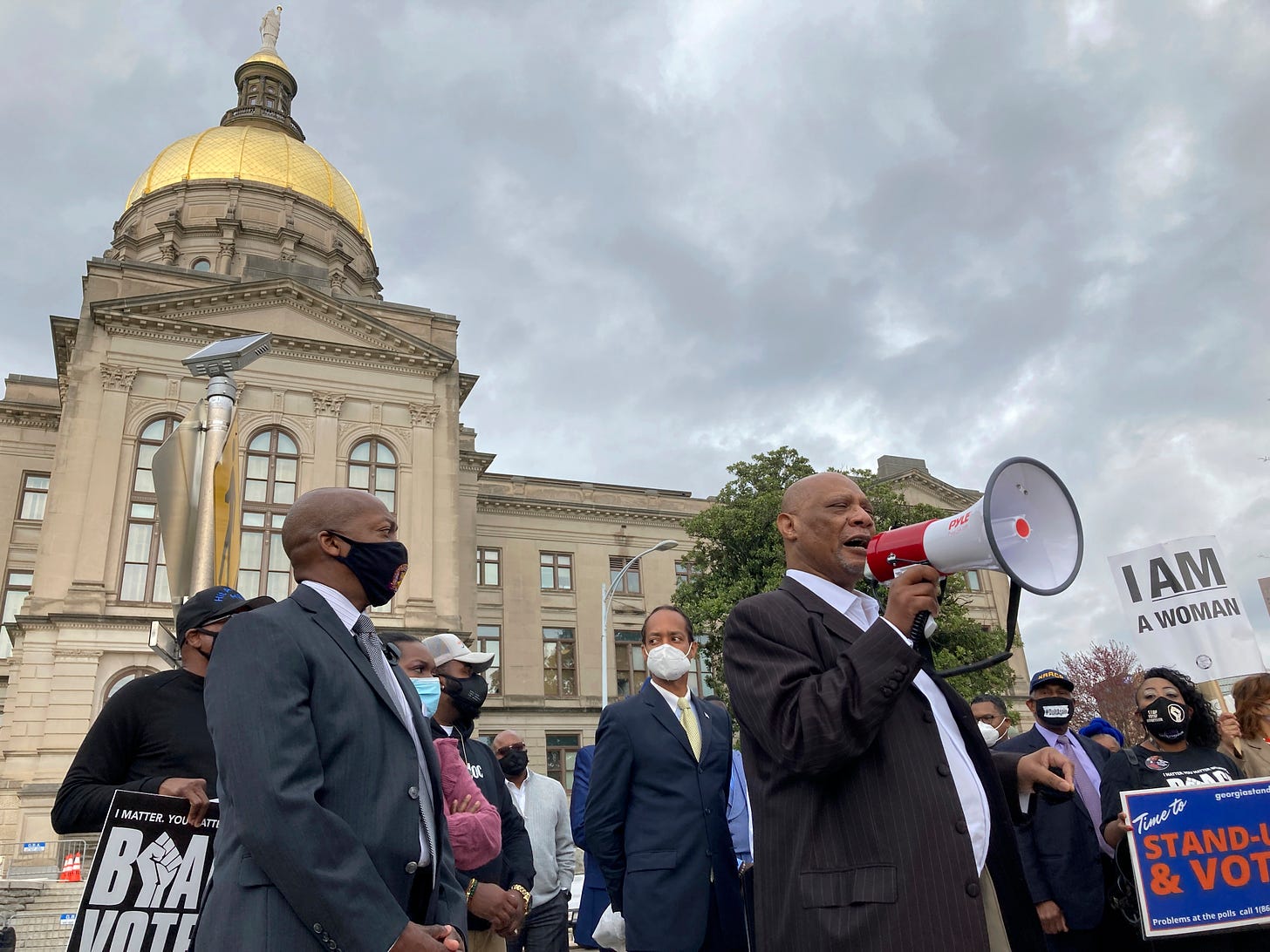
Frankly, there’s a lot that White congregations could learn about prophetic political leadership from their Black counterparts. The freedom of these congregations to put their faith into action should be respected and protected, which is why we find voter suppression efforts aimed at limiting the nonpartisan activities of Black churches abhorrent.
Still, we fear that the influence churches wield makes them targets for political exploitation and co-opting. Politicians want to win, and will understandably go to where the people are to find the few extra votes needed in a tight race. But regardless of who does it, we’re troubled by politicians giving explicitly partisan campaign speeches during worship services — especially when it’s a hit-and-run monologue as a politician doesn’t even bother to stay for a service. These holy spaces shouldn’t be weaponized as field offices for one political party.
There are three more Sundays before voting ends in Virginia this year. We pray the gubernatorial candidates won’t further disrupt services. And we hope their church election strategies aren’t a bellwether for how politicians across the country will act in the midterm campaigns.
As a public witness,
Brian Kaylor & Beau Underwood
Help sustain the ministry of Word&Way by subscribing to A Public Witness!

